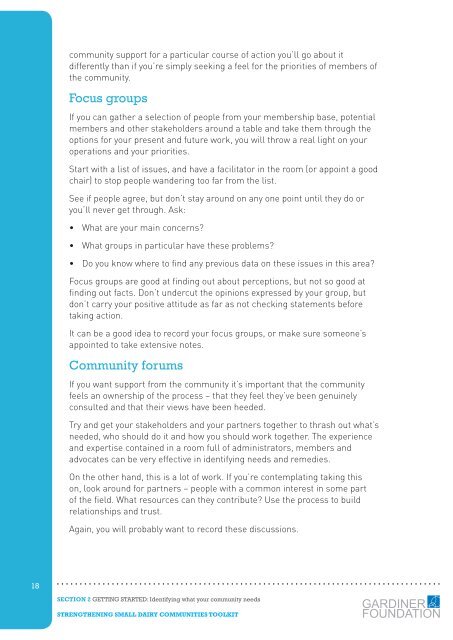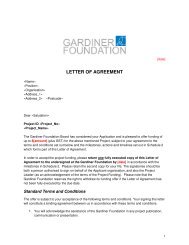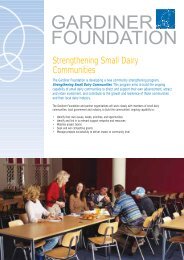The Complete Toolkit - Gardiner Foundation
The Complete Toolkit - Gardiner Foundation
The Complete Toolkit - Gardiner Foundation
You also want an ePaper? Increase the reach of your titles
YUMPU automatically turns print PDFs into web optimized ePapers that Google loves.
community support for a particular course of action you’ll go about it<br />
differently than if you’re simply seeking a feel for the priorities of members of<br />
the community.<br />
Focus groups<br />
If you can gather a selection of people from your membership base, potential<br />
members and other stakeholders around a table and take them through the<br />
options for your present and future work, you will throw a real light on your<br />
operations and your priorities.<br />
Start with a list of issues, and have a facilitator in the room (or appoint a good<br />
chair) to stop people wandering too far from the list.<br />
See if people agree, but don’t stay around on any one point until they do or<br />
you’ll never get through. Ask:<br />
• What are your main concerns?<br />
• What groups in particular have these problems?<br />
• Do you know where to find any previous data on these issues in this area?<br />
Focus groups are good at finding out about perceptions, but not so good at<br />
finding out facts. Don’t undercut the opinions expressed by your group, but<br />
don’t carry your positive attitude as far as not checking statements before<br />
taking action.<br />
It can be a good idea to record your focus groups, or make sure someone’s<br />
appointed to take extensive notes.<br />
Community forums<br />
If you want support from the community it’s important that the community<br />
feels an ownership of the process – that they feel they’ve been genuinely<br />
consulted and that their views have been heeded.<br />
Try and get your stakeholders and your partners together to thrash out what’s<br />
needed, who should do it and how you should work together. <strong>The</strong> experience<br />
and expertise contained in a room full of administrators, members and<br />
advocates can be very effective in identifying needs and remedies.<br />
On the other hand, this is a lot of work. If you’re contemplating taking this<br />
on, look around for partners – people with a common interest in some part<br />
of the field. What resources can they contribute? Use the process to build<br />
relationships and trust.<br />
Again, you will probably want to record these discussions.<br />
18<br />
SECTION 2 GETTING STARTED: Identifying what your community needs<br />
STRENGTHENING SMALL DAIRY COMMUNITIES TOOLKIT




